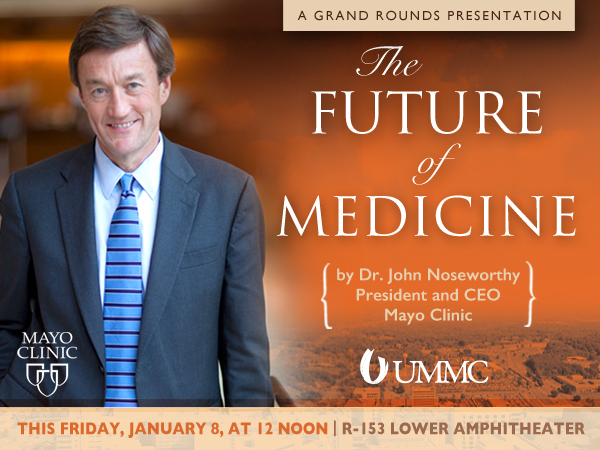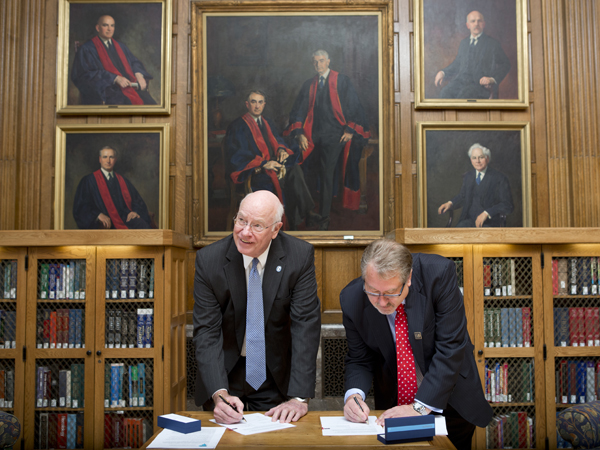Mayo Clinic president, CEO gives preview of tomorrow’s health care

Dr. John Noseworthy, professor of neurology and president and CEO of the Mayo Clinic, will present Grand Rounds Friday at the University of Mississippi Medical Center.
He will speak on “The Future of Medicine” at noon in R153. The presentation is open to all faculty, staff and students.
UMMC leadership asked Noseworthy to address the future of medicine because it's so critical to the current status of health care, said Dr. Richard Summers, professor of emergency medicine and associate vice chancellor for research.
“It's very relevant with all the changes going on with population health, precision medicine and how we will think of medicine in the future,” Summers said.
Noseworthy will discuss health care's external environment, including what Americans face in health care, the Mayo Clinic's strategy for dealing with the challenges, and the role of partnership in collective success.
A Massachusetts native, Noseworthy came to the Mayo Clinic in 1990, joining its board and becoming president and CEO in 2009. Every year, more than a million people from across the nation and about 150 countries seek specialized care at the Mayo Clinic, which operates in six states and is dedicated to medical care, research and education.

The Mayo Clinic and UMMC formed an institutional bond in 2010, and in 2014 committed to broadening and deepening their collaboration in clinical trials, medical research and education. The agreement is a formal commitment to enhance the relationship that has been steadily building for the past 20 years. UMMC leaders say the relationship with Mayo Clinic can be transformational for the Medical Center across its missions of research, education and health care.
In addition to translational research and research into the genetic underpinnings of disease through epidemiological research, collaborative efforts between Mayo and UMMC include clinical research projects that look at genetic variations in treatment response. Future collaborations are planned in graduate education and the mentoring and development of emerging clinical researchers, and conducting faculty exchanges.
Noseworthy received his doctor of medicine degree at Dalhousie University in Halifax, Nova Scotia, Canada, and completed an internship at the Royal Columbian Hospital, also serving as chief resident of internal medicine and as a neurology resident at Dalhousie. He is a fellow of the Royal College of Physicians and Surgeons of Canada.
Noseworthy completed a residency in the neuroimmunology laboratory at Ebers University Hospital in Ontario, a residency in neuropathology at the University of Western Ontario, and a research fellowship in pathology at Harvard Medical School and in neurology at Massachusetts General Hospital.
At the Mayo Clinic, Noseworthy served as Department of Neurology chair from 1997-2006 and vice chair of the Mayo Clinic Rochester Executive Board and medical director for development from 2006-09. As a neurology professor, he specialized in multiple sclerosis and spent more than two decades designing and conducting controlled clinical trials.
Just as the Mayo Clinic is renowned nationally for its medical care and research, UMMC's vision for the future includes more prominence in the health-care arena and the strengthening of partnerships such as that enjoyed with the Mayo Clinic, Summers said. “We want to (achieve) the next tier,” he said.
Mayo's commitment to the future of medicine is discussed on its “The Future of Health Care” blog found at http://futureofhealthcareblog.mayoclinic.org/
“Mayo Clinic envisions the future of health care as one where it helps 200 million patients by 2020,” a June 2015 blog entry reads. “Mayo will accomplish this by applying innovative science and data to study the quality, safety and value of health care. It also involves scaling Mayo Clinic's knowledge and partnering with others to determine how health care providers can deliver the best patient care.”
“. . . Our people take the time to listen and thoroughly understand your health issues and concerns,” Noseworthy says on the Mayo Clinic's website in his statement on “What Sets Mayo Clinic Apart.”
“And we will tirelessly look for answers until we find them. We are committed to providing the best care for every patient every day. That is our mission and our pledge to you as we work together to discover, practice and teach the medicine of tomorrow,” he says in the statement.


